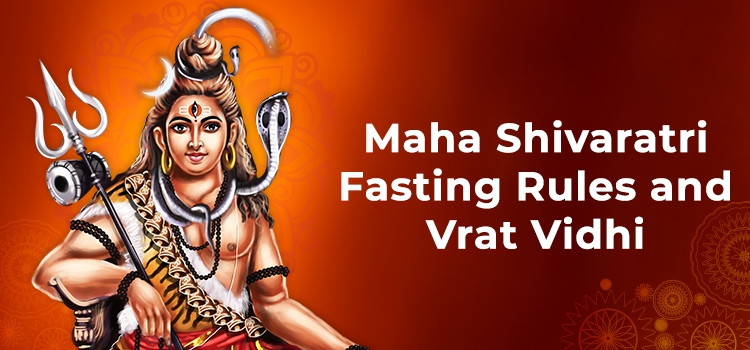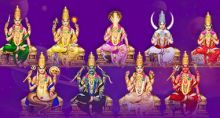Maha Shivaratri Fasting Rules and Vrat Vidhi
For those who worship Shiva, the festival of Maha Shivaratri holds great significance. It is also said that Shiva once confided to Parvati that the fast observed by his devotees on this day was very dear to him and that he valued it more than the other rituals like Poojas and Abishekams. Hence, it is mandatory for Shaivites to observe Maha Shivaratri as a way of pleasing their favorite deity, Shiva. Fasting on this day is believed to bestow Moksha or salvation.
Maha Shivaratri falls on the 14th day of Krishna Paksha in Phalgun (Feb-Mar) month. Shivaratri is observed on the 14th day of Krishna Paksha every month as well.
Unlike most Hindu festivals, which are exuberant and colorful, Maha Sivaratri is marked by solemnity. The focus is on introspection, fasting, meditation, self-study, and jaagran, or night-long vigil at Shiva temples.

For Shaivites, this night is all about overcoming darkness and ignorance. The sacred Panchakshari Mantra ‘Om Namah Shivaaya’ is chanted all day in Shiva temples, and Shiva Chalisa is recited by devotees. Maha Shivaratri is celebrated for three or ten days based on the Hindu calendar.
Many Puranas, like the Skanda Purana, Linga Purana, and Padma Purana, mention Maha Shivaratri. These are medieval-era Shaivite texts. There are different legends about the significance of Maha Shivaratri. One says that on this night, Shiva performed the cosmic dance of creation, preservation, and destruction, called Thandav.
Another legend says that Shiva and Parvati got married on this night. Yet another legend states that it is an opportunity to erase past sins and embark on a virtuous path in life, which will help one to attain Moksha or liberation from the birth and death cycle.
Maha Shivaratri is an important occasion for annual dance festivals at major Hindu temples. The festivals are held at temples in Konark, Modhera, Chidambaram, and Pattadakal. The event is called Natyanjali, meaning "worship through dance", at the Chidambaram Nataraja temple.
Maha Shivaratri is also called Padmarajaratri. The terms mean ‘the great night of Shiva’.
Maha Sivaratri 2023 is on February 18. This year, Shani Pradosh Vrat coincides with Maha Shivaratri. The belief is that one can have a son if one worships Shiva and observes the Shani Pradosh fast.
In 2023, the Chaturdashi date of Krishna Paksha of Phalgun month starts from 08.02 pm on Saturday, 18 February. Chaturdashi Tithi will end on February 19, Sunday, at 04:18 in the evening.
Maha Shivaratri Rituals
The rituals begin a day before Maha Shivaratri, most likely on Trayodashi. Devotees should eat only one meal (sattvik). On Shivaratri, after the morning rituals, one should take Sankalp (oath) to observe the full-day fast. As the fast is difficult, people seek divine blessings to complete it successfully. Devotees can perform Maha Shivaratri Pooja at home, or they can go to a temple. Usually, they visit a Shiva temple during the day and perform Shiva Pooja at home during the night.
How to Perform the Pooja?
Place the Shiva Lingam on the Pooja platform. Do Abishekam with milk, rosewater, sandal paste, curd, honey, ghee, sugar, and water. Offer a garland made of the Bilva tree’s leaves. Dhatura flowers, bhang, and Panchamrit can also be offered. Then apply some chandan or kumkum to the Lingam, burn incense sticks, and perform Arti to the Lingam. You can also offer Madar flowers and holy ash (vibhuti). After the Pooja, do meditation and recite Shiva Mantras to invoke Shiva’s blessings.
Fasting rules
The Maha Sivaratri fast begins at dawn and continues until the next morning. The fast should end only during the Parana timing as per the Hindu calendar or Panchang.
The benefits of the fast will be doubled if one observes a night-long vigil. Along with the vigil, one should perform Shiva Pooja at home or the temple. One can either observe a strict fast by avoiding food, drinks, and water completely or opt for a partial fast by taking milk, fruits, and water.
The main thing to keep in mind during Maha Shivaratri is to shun all forms of negativity in the form of bad thoughts, bad company, and bad words. One should be virtuous in word and deed and keep away from all evils.
Staying at the temple, chanting Shiva’s names, and listening to stories of his glory can benefit the devotee immensely.
The reason for observing the fast and vigil is to master one’s senses and control one’s desires. In this manner, one’s mind, body, and soul become pure, which helps one to focus completely on Shiva.



















